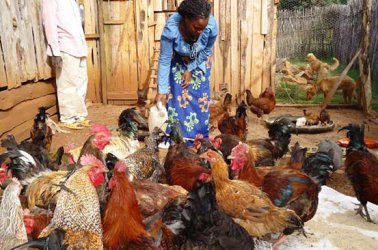Three years ago, Hellen Koech bought three hens and a cock from her neighbour in Kabiemit, Chepkorio ward in Elgeyo Marakwet County.
Today, she is the proud owner of more than 1,000 birds,her three hens and one cock having multiplied to 200 birds within the first year.
Many people told her off when she began, but a determined Koech embarked on a mission that has now made her a role model to many women in her village and beyond.
“I once told my husband that my goal was to one day be referred to as ‘makuku lady’. I want to be as famous as the Muguku Farm in Kiambu, which supplies thousands of chicken,” says Koech with a confident chuckle.

Indeed, Nelson Muguku, the founder of Muguku Farm, who died a billionaire in 2010, started his chicken empire with two hens and a cock in 1956.
At Koech’s homestead, a simple chicken coop is classically designed to comfortably keep the growing population of birds. Some compartments have been specifically built to cater for various stages of birds and enhance egg safety.
“I use the free-range system to rear my chickens within my compound which is cost effective since I feed them with little food supplements unlike those who use the caging system and heavily rely on expensive poultry feeds only,” the farmer says.
Koech allows her chicks to stay with the ‘mother hen’ for a few days so that the hens can start laying within the shortest period of time.
High demand
“When I separate the chicks from mature hens, I take them to a customised Chepkube (traditional oven made of mud, tins and wiremesh) for warmth to shield them from vagaries of weather,” she says.
She takes care of the chicks for two weeks when they are ready to fend for themselves.
Koech says her poultry venture makes her a profit of Sh350, 000 in six months. “Depending on the weight of mature birds, the price ranges from between Sh1, 000 to Sh2,000 for each,” she says.
“The business supplements the family’s other sources of income. This has enabled us pay school fees for our children and invest in other sectors,” says the proud mother of three.
Koech does not sell her eggs. She instead uses them to grow her flock, smartly filling the gaps left when she sells mature birds.
The high demand for kienyeji chicken has provided her with an insatiable market from major towns in as far as Nairobi, Bungoma, Kakamega and closer home in Eldoret.
“There is a growing preference for kienyeji chicken due to health concerns. It is for this reason that clients, including some leading hotels in Eldoret, make early orders for my birds,” she says.
But Koech is not resting on her laurels. She is initiating a ‘chicken loan’ which entails giving interested women two chicks each to start their own kienyeji chicken venture. Once these two chicks have hatched, the women are supposed to return the same number to her with no interest.
To start the chicken venture, she says, one needs little start-up capital. The use of locally available materials like old mabati to build simple chicken houses helps save on costs.
But like many other successful ventures, Koech has seen her fair share of challenges. When she started out, the cold Elgeyo Marakwet weather and coccidiosis disease conspired to rob her of many chicks.
Her ingenious way of using the customised traditional oven, primarily used in the region to keep ugali warm for a long period, to warm her chicks and a concoction of traditional herbs has helped her reverse the situation.
“We use a concoction of dissolved pepper and herbs served to the birds as drinking water to counter the effects of coccidiosis. I rarely invite vets to treat my birds,” she says.
Despite the challenges, Koech plans to replenish her stock with improved local chicken breeds and plans to buy an incubator so she can increase the survival of chicks when they are separated from their mother hens.
It is, however, the problem of poor market structures and exploitation by middlemen coupled with her relatively poor marketing skills, factors that are literally out of her control, that is worrying her.


Am touched with work can u allow me to visit your farm for leaning please